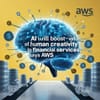Artificial intelligence (AI) is revolutionizing the financial services industry by augmenting human creativity and judgment, rather than replacing them. According to John Kain, head of market development for AWS in financial services, AI will boost the value of human creativity in financial services, making critical functions like banking, insurance, and trading even more valuable.
AI is being used to automate routine tasks, freeing up human resources to focus on more complex and creative aspects of work. For instance, AI can perform risk calculations, investment research, and customer service tasks, allowing humans to concentrate on higher-value tasks. Additionally, AI-powered chatbots and virtual assistants are improving customer interactions, providing personalized recommendations, and optimizing financial decision-making.
In the financial sector, AI is also being used to analyze massive datasets, identify market trends, and optimize portfolio strategies with unprecedented precision. Furthermore, AI-powered systems are analyzing millions of transactions per second to spot suspicious activity and reduce financial crime.
As AI continues to evolve, it's likely to drive innovation, improve decision-making, and optimize operations in the financial services sector. However, it's essential to strike a balance between technological advancements and human judgment, ensuring that AI enhances efficiency without compromising ethics, security, or trust.
The World Economic Forum's "Artificial Intelligence in Financial Services 2025" report highlights the significant potential of AI to transform the industry, with global AI investments in financial services projected to grow from $35 billion in 2023 to $97 billion by 2027. With AI set to play an increasingly important role in financial services, the industry will need to adapt and innovate to reap its benefits.


